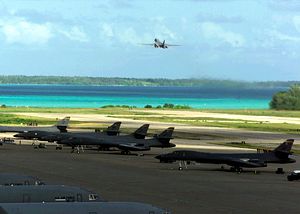On October 3, the governments of the United Kingdom and Mauritius finalized an agreement that would see the Chagos Islands returned to Mauritian sovereignty.
Both Mauritius, an island nation off the eastern coast of Africa, and the Chagos Islands, an archipelago of over 60 islands in the Indian Ocean, were formerly British colonies. Due to the Chagos Islands’ strategic location, London was loathe to cede control – so in 1965, just a few years before Mauritian independence, the U.K. split the Chagos Islands into a separate administrative entity, the British Indian Ocean Territory. That allowed the U.K. to keep control over the Chagos archipelago, something Mauritius has protested.
In 2019, Mauritius received a huge boost to its case when the International Court of Justice rules that British rule over the Chagos Islands was “unlawful.” Shortly after, the United Nations General Assembly voted in a landslide (116-6) to order the U.K. to “withdraw its colonial administration” within six months.
Five years later, the United Kingdom has finally agreed to do just that, after years of talks with Mauritius. According to a joint statement issued by both governments on October 3, “the United Kingdom will agree that Mauritius is sovereign over the Chagos Archipelago.” The U.K. will also “provide a package of financial support to Mauritius” that will implement infrastructure projects and assist with maritime security, in addition to creating a trust fund for the Chagossians, who were forcibly displaced from their home islands.
The joint statement noted that the agreement “is subject to the finalization of a treaty and supporting legal instruments, which both sides have committed to complete as quickly as possible.”
At the heart of the Chagos issue is the question of Diego Garcia – the largest of the Chagos Island and home to a strategically crucial U.S. military base. As David Vine, the author of “Island of Shame: The Secret History of the U.S. Military Base on Diego Garcia,” wrote in a 2019 article for The Diplomat Magazine, “while the base may be a joint installation technically, it is a U.S. base and de facto U.S. territory at the center of the Indian Ocean.” Diego Garcia has been used in the U.S. invasion of Iraq and Afghanistan, as well as military operations in Libya.
The base at Diego Garcia, which the United States insists “plays a vital role in national, regional, and global security,” came at a steep cost: the displacement of the entire native population. Vine describes the tragedy:
Between 1971 and 1973, U.K. officials used overcrowded cargo ships to deport the Chagossians from Chagos 1,200 miles to Mauritius and the Seychelles… Exiled, Chagossians effectively received no resettlement assistance. In 1975, the Washington Post found Chagossians in Mauritius living in “abject poverty.” For nearly 50 years, Chagossians have demanded the right to go home and proper compensation. In the late 1970s and early 1980s, some received compensation totaling about $6,000 per recipient and, for some, a small, concrete-block house. Chagossians in the Seychelles received nothing.
Numbering several thousand people today, including generations born in exile, many Chagossians remain impoverished.
The racial component of the Chagossians’ treatment is undeniable. “Reflecting broader Anglo-American attitudes, a British official called the Chagossians ‘some few Tarzans’ and, in a racist reference to the novel Robinson Crusoe, ‘Man Fridays,’” Vine noted.
The new agreement means that Mauritius can begin to resettle the Chagossians on their home islands – but not on Diego Garcia. Instead, the island will continue to be under de facto U.K. authority for “an initial period of 99 years.” According to the joint statement, the United Kingdom is “authorized to exercise with respect to Diego Garcia the sovereign rights and authorities of Mauritius required to ensure the continued operation of the base.”
In other words, while the U.K. recognized Mauritius’ sovereignty over Diego Garcia, in practice London will continue to exercise authority over the island, while providing an annual payment for the privilege. And for that reason, no Chagossians can resettle there.
Clive Baldwin, a senior adviser at Human Rights Watch, warned that the agreement does not adequately address the Chagossians’ quest for justice: “It does not guarantee that the Chagossians will return to their homeland, appears to explicitly ban them from the largest island, Diego Garcia, for another century, and does not mention the reparations they are all owed to rebuild their future.”
The U.K. government, which faced criticism at home for reverting the Chagos Islands to Mauritius’ sovereignty, pointed to the continued operation of Diego Garcia as a win. Its own statement noted, “For the first time in more than 50 years, the status of the base will be undisputed and legally secure.”
In a sign of the complex geopolitics at play, the Mauritius-U.K. joint statement made a point of saying: “In reaching today’s political agreement, we have enjoyed the full support and assistance of our close partners, the United States of America and the Republic of India.”
Both the United States and India issued their own statements welcoming the agreement. A statement from the White House called the deal “a clear demonstration that through diplomacy and partnership, countries can overcome long-standing historical challenges to reach peaceful and mutually beneficial outcomes.”
India noted that it “has consistently supported Mauritius’s claim for sovereignty over Chagos, in line with its principled stand on decolonization and support for the sovereignty and territorial integrity of nations, as well as its longstanding and close partnership with Mauritius.”
India has a strong defense partnership with Mauritius, including constructing an Indian Navy staging base at Mauritius’ North Agalega Island, giving New Delhi a long-sought foothold in the central Indian Ocean.

































